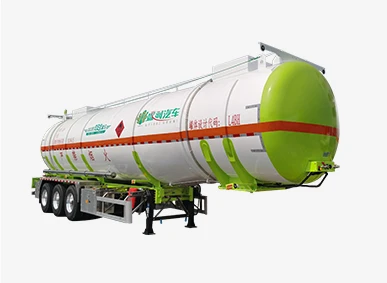Do you know the 6 precautions for the safe transportation of oil tank semi-trailers?
6 precautions for safe transportation of oil tankers
Precautions for controlling combustibles
① It is necessary to prevent the oil storage container of the tank truck from overflowing. The running, escaping, dripping, leaking, and oil spills that occur during the loading and unloading of oil products on tank trucks should be cleaned up and dealt with in time.
② It is strictly forbidden to pour oil, sludge, waste oil, etc. into the sewer after the tanker unloads the cargo, and it should be collected and disposed of in a designated place.
③ All inflammables should be removed near buildings such as oil tanks, warehouses, pump rooms, oil distribution rooms, and oil blending workshops.
④ Oiled cotton yarn, oiled rags, oiled gloves, oiled paper, etc. used for oil tanker maintenance and maintenance should be placed in a covered iron drum outside the workshop and removed in time.
Precautions for Cutting off Ignition Sources
① It is strictly forbidden to bring matches, lighters or other fires into the oil depot, oil product storage area, and oil product receiving and dispatching operation area. Strictly control the flow of fire sources and open flame operations.
② Fireworks are strictly prohibited in the oil depot. When open fire must be used for repair work, it must be reported to the relevant department for review and approval, and safety precautions must be taken before starting fire.
③ Before cars and tractors enter the warehouse, they must wear a fireproof cover at the exhaust pipe opening, and immediately turn off the engine after parking, and it is strictly forbidden to overhaul the vehicle in the warehouse, and it is also forbidden to start the engine during the operation.
④ When railway locomotives are put into the warehouse, separate vehicles must be added, the baffle of the ash box should be closed, and the furnace should not be cleaned in the warehouse area or stay in the non-operation area.
⑤ The oil tanker docked at the pier and said that the use of naked flames is strictly prohibited. It is forbidden to bring fire sources on board.
Prevent sparks from burning and exploding
① Various electrical equipment used in oil depots and all workplaces must be explosion-proof, and the installation must meet safety requirements, and the wires must not have broken skins, exposed wires, or short circuits.
② Over the oil depot, it is strictly forbidden to cross high-voltage wires. The distance between the oil storage area and barreled light oil warehouse and the electric wire must be greater than 1.5 times the length of the electric pole.
③ The rails leading into the oil depot must be installed with insulating partitions before the entrance to prevent the external power supply from flowing into the oil depot from the rails to cause electric sparks.
Prevent sparks generated by metal friction to cause combustion and explosion
① Strictly implement the relevant regulations on entering and exiting warehouses and operating areas. It is forbidden to wear spiked shoes or iron shoes to enter the oil depot, let alone climb oil tanks, oil tankers, oil tank cars, oil tank cars and step on oil drums, and prohibit mules, horses and iron wheels from entering the oil depot.
② It is not allowed to use iron tools to knock out the lid of the container. When opening the lid of the vat and tanker, a copper wrench or an alloy wrench that will not generate sparks should be used when colliding.
③ Metal containers should be avoided from colliding with each other in the warehouse. It is even more impossible to roll an oil drum without a gasket on the concrete floor.
④ During the oil loading and unloading operation of the tank truck, it is necessary to avoid the collision of the loading and unloading crane pipe when it is inserted and pulled out of the tank port or the hatch of the tanker. Where there is oil and gas, ferrous metals cannot be touched.
Prevents oil vapor buildup that can cause fires and explosions
① It is strictly forbidden to repair and weld unwashed oil barrels, oil tanks, oil tanks and other storage containers. The container after washing should be opened for ventilation before preparing for welding, and the visual explosion should be carried out if necessary.
② Barrel-packed light oil products stored in the warehouse should be checked frequently and replaced in time if leakage is found. The warehouses, sheds and dispatch rooms for light oil in barrels should maintain air flow.
③ Underground and cave oil tank areas, strictly prevent oil leakage, install ventilation equipment, keep good ventilation, and avoid accumulation of oil and gas.
transport anti-collision anti-leakage
① Try to arrange the external interface of the tank at the head of both ends of the cylinder because this part is not easy to be hit;
② The valve should be built-in as much as possible to reduce the part of the valve protruding from the cylinder and reduce or avoid impact;
③ The part of the tank truck valve protruding from the cylinder body should have guardrails of sufficient strength to protect the valve from impact;
④ Install leakage alarms at the places where the inlet and outlet valves are more concentrated for the tank trucks filled with highly hazardous and toxic media;
⑤ Emergency plugging devices should be added to the tank trucks containing high-level and extremely hazardous toxic media, and emergency plugging measures can also be taken in case of toxic media leakage.





